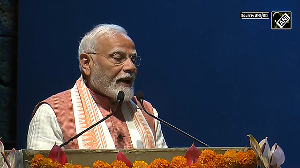Take a look at what is happening at Siruseri, on the outskirts of Chennai. Here a rolling, 70-acre stretch of land -- a part of SIPCOT's IT park -- is about to be turned into one of the key tech destinations in India.
When work is completed this will be the key base for India's largest software company, TCS. The 70-acre Siruseri campus will developed at a cost of Rs 200 crore (Rs 2 billion) and about 3,000 people will be working here three years from now.
Also in Chennai, but on a slightly smaller scale, there's Cognizant's new techno-complex in Thoraipakkam about 7 km from Tidel Park. Visitors to this 9.2-acre complex might be forgiven for thinking they had suddenly been transported to a Silicon Valley site.
The building is a fusion of glass and metal and the driveway leads to a canopied entrance that, in turn leads to a sprawling glass-panelled lobby-cum-reception. The complex will cost around Rs 125 crore (Rs 1.25 billion) and will house around 3,400 people when completed later this year.
But Chennai is still far behind Hyderabad when it comes to hi-tech campus life. The entire tech world seems to be making a beeline to the outskirts of Hyderabad where Chandra Babu Naidu's government is distributing land freely.
In all, about 200 acres of land has been given out and about seven companies are already functioning from campuses. Another 11 have acquired land and associations like the Hyderabad Software Exporters Association are also getting into the act.
The companies that are establishing themselves on Hyderabad's outskirts include the top names of the infotech world. Wipro is taking 30 acres and Microsoft will have about 20 acres.
TCS is putting up its facilities on an 11-acre plot and Oracle on 9 acres. Satyam's BPO venture Nipuna is taking about 17 acres.
But the campus boom isn't confined to tech capitals like Bangalore, Chennai and Hyderabad. Even slow-moving Bhubaneswar is getting its share of sprawling campuses.
Infosys has made its home here, on a 25-acre campus that has two three-storey office blocks and an entertainment arcade that includes a gym, health club and multi-cuisine food court.
A few miles away, Satyam Computers has built itself a ship-shaped building on an 8-acre campus.
Why are tech companies giving up on high-rise buildings and moving into campuses? First, don't forget that campus life has become the norm in places like Silicon Valley and Redmond.
In India, companies like Infosys and Wipro have also established their sprawling bases far from the city centres.
But that isn't the only reason. The software companies are growing at a furious pace and their demand for new office space is insatiable.
For example, in Hyderabad Microsoft is planning a 750,000 sq ft building and Oracle is planning to have 500,000 sq ft of built-up space. Convergys plans to have 160,000 sq ft office space for its software services, call centre and a dedicated data centre.
Or, look at TCS which is gobbling up office space at an extraordinary speed. It currently operates out of seven locations in Chennai and its demand for space isn't about to slow down.
All this will be consolidated into two centres including Siruseri. TCS has huge growth plans. It currently employs about 5,000 people in Chennai and that is likely to climb to about 7,500 in the next 24 to 36
Also, these companies want space where they can stretch themselves. Take Motorola in Bangalore which is setting up one of India's largest captive R&D facilities.
Motorola's offices will be spread over 6 acres and will have a built-up area of about 28,000 sq ft. The company has about 1,200 employees and has just hired another 180. Says Soumitra Sana, managing director, Motorola India Electronics: "The centre will integrate its two existing centres under one roof."
Similarly, SAP Labs in Bangalore, has over 700 employees currently and its new campus will have room for about 750. But SAP is also on a hiring spree so in the second phase the campus buildings will be expanded to accommodate another 350 people.
In three years time SAP plans to have about 2,000 staffers, so it will keep building on its 21-acre site at Export Promotional Industrial Park, Whitefield, Bangalore.
Having more space to play around with, means that the companies can afford to make the workplace a more friendly place with cafeterias and recreation rooms.
Cognizant's Chennai facility, for instance, has a giant cafeteria that can seat 1,000 people simultaneously. It also has space for indoor and outdoor games and a gymnasium.
Similarly, Motorola will also have lavish facilities including a gymnasium, an amphitheatre, a tennis court, and a child care centre.
The company has about 1,200 employees and has just hired another 180. Adds Clas Neumann, joint managing director, SAP Labs India: "We are creating environment not just buildings."
Many companies are making lavish provision for recreation facilities. Infinite Computer Solutions, for instance, has just bought 6 acres of land in Whitefield and it wants to build low-rise buildings and sprawling gardens. Out of 50,000 sq ft being built in the first phase, about 15,000 sq ft will be for recreation areas.
Says Upinder Zutshi, COO, Infinite Computer Solutions: "Since the employees spend most of their time at their offices, the idea is to extend the same friendly atmosphere."
Inevitably, construction work never stops on many of these campuses. For instance, Infosys already has two blocks in Bhubaneswar that can accommodate 1,200 staffers. A third block is now under construction and when that is completed there will be room for about 2,000 people.
It's much the same story everywhere. Microsoft is planning a 2,000-seat high-end technical helpdesk at it campus on the outskirts of Hyderabad. It could have upto 4,000 people working there.
And Kanbay, the US-based $105 million software solutions company, plans to hire 3,000 people by end of 2006. Oracle plans to increase its staff strength to 6,000 people in next three years at its Bangalore and Hyderabad centres put together.
One problem with out-of-town campuses is getting there. Most campuses have carefully calculated the cost of busing employees to work against the fact that land is cheaper and larger areas are available further out of town.
Some companies like Motorola, however, says that it was already transporting employees so there isn't much difference now it has moved to a new campus.
Congenial surroundings also help prevent rivals from poaching employees. Says Neumann: "We can create a sense of belonging to the organisation in a campus environment."
In recent years, India has seen a revolution in hi-rise glass-and-steel buildings. But the hi-tech industry could be about to re-define the concept of what an office should look like.
Additional reporting: Sanjay K Pillai, Raghavendra Rao and Dilip Satapathy






 © 2025
© 2025